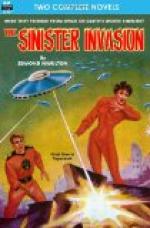Lockley watched Jill’s face. As she heard the references to Vale, she went white, but she saw Lockley looking at her and said fiercely, “They don’t know that the visitors didn’t kill you and let you and the other three men escape. Someone ought to tell these broadcasters....”
Lockley did not answer. In his own mind, though, there was the fact that of the two workmen who’d been paralyzed and released, the three men in the compost pit shell, and himself, none had seen their captors. But Vale had.
The broadcaster went on with a fine air of confidence, reporting that yesterday afternoon a helicopter had flown into the mountains to examine the landing site in detail since it could not be examined from a high-flying plane.
Lockley remembered the droning he and the others had heard through the metal plates of their prison.
The helicopter had suddenly ceased to communicate. It is believed to have had engine trouble. However, later on a fast jet had attempted a flight below the extreme altitude of the photographic planes. Its pilot reported that at fifteen thousand feet he’d suddenly smelled an appalling odor. Then he was blinded, deafened, and his muscles knotted in spasms. He was paralyzed. The experience lasted for seconds only. It was as if he’d flown into a searchlight beam which produced those sensations and then had flown out of it. He’d instinctively used evasive maneuvers and got away, but twice before he passed the horizon there were instantaneous flashes of the paralysis and the pain. Scientists determined that the report of the men who’d been paralyzed and released agreed with the report of the pilot. It was assumed that whatever or whoever had landed in Boulder Lake possessed a beam—it might as well be called a terror beam because of the effects it had—of some sort of radiation which produced the paralysis and the agony. Unless the three men missing from the construction camp had died of it, however, it was not to be considered a death ray.




